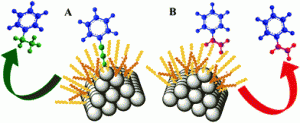
(A) Phenyl acetylene penetrating the Pd-NP in the ligand shell and (B) styrene cannot get attached on the ligand capped Pd-NP.
Whether or not we actively think about it, catalysts effect our every day lives. With applications in automobiles and chemical reactions, catalysts enable modern technologies and have been the subject of much recent research and investment.
When it comes to innovation in catalyst design, Seth et al.’s November 2014 Communication demonstrates a way to create smaller, more selective monolayer-protected palladium nanoparticles (Pd NPs). While they use a common digestive ripening method, the authors indicate that they perform a unique synthesis step for their Pd NPs; unlike in the traditional synthesis, they do not remove the surfactant during their reflux stage. Using x-ray diffraction (XRD) and transmission electron microscopy (TEM), nanoparticle sizes were calculated to be 1.5 and ~1.8 nm respectively. XRD and x-ray photoelectron spectroscopy (XPS) confirmed the presence of Pd(0), while the presence of organic molecules (owing to the ligand shell) was demonstrated via thermogravimetric analysis.
In terms of catalyst action, the authors hypothesize that terminal alkynes can penetrate the ligand shell and undergo hydrogenation to alkenes while other functional groups may not be able to penetrate the shell. In order to test this hypothesis, they incubated their Pd NPs with phenyl acetylene and styrene and evaluated the results using both Fourier-transform infrared spectroscopy and XPS. Results indicated that phenyl acetylene interacted with the Pd surface, while the styrene-incubated surfaces showed no such result. Additionally, according to Seth et al., the MLP Pd NPs could be reused four to five times.
While the authors note that steric hindrance plays a role in this selectivity, they leave the complete mechanism for selectivity for future work.
A simple method for the preparation of ultra-small palladium nanoparticles and their utilization for the hydrogenation of terminal alkyne groups to alkanes
Jhumur Seth, Chandrababu Naidu Kona, Shyamsundar Das and B. L. V. Prasad
Nanoscale, 2015, 7, 872-876. DOI: 10.1039/C4NR04239E
Stephanie E. Vasko is currently a Senior Research Assistant at The Rock Ethics Institute at the Pennsylvania State University in State College. Her research focuses on science communication, STEM education, and the intersections between art, craft, and science. You can follow her on Twitter at @stephanievasko.
The opinions and views expressed in this piece are those of the author and do not represent or reflect the opinion, views, or policy of the Pennsylvania State University, the Rock Ethics Institute, or the National Science Foundation.










